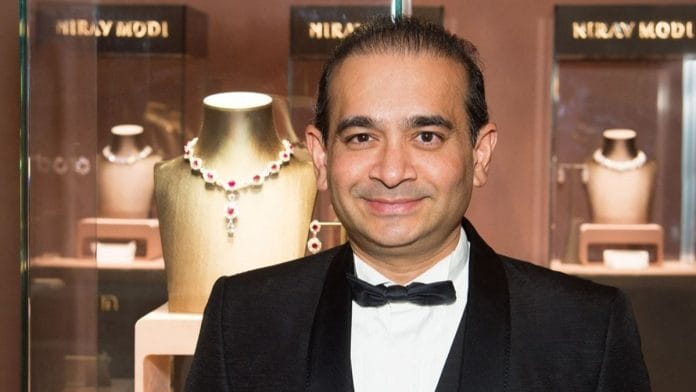London: Nirav Modi faces a substantial risk of suicide amid an overwhelming impact of COVID-19 at Arthur Road Jail in Mumbai, where he will be lodged on being extradited, the High Court in London was told during an extradition appeal hearing on Wednesday.
Justice Martin Chamberlain presided over the “renewal application” hearing, held under the court’s COVID-19 video conferencing setting, and has reserved his judgment, to be handed down in writing at a later date, on whether to grant Nirav permission to appeal against his extradition ordered by District Judge Sam Goozee in February and certified by UK Home Secretary Priti Patel in April.
The bearded 50-year-old diamond merchant, wanted in India to face charges of fraud and money laundering in the estimated USD 2-billion Punjab National Bank (PNB) scam case, observed the remotely held court proceedings from his Wandsworth Prison in south-west London dressed in a black suit and white shirt.
Helen Malcolm, the Crown Prosecution Service (CPS) barrister appearing on behalf of the Indian authorities, argued against permission to appeal by reiterating that the expert evidence on Nirav’s mental health has not been disputed and that the regime awaiting him in Mumbai is based on assurances from the government of India of adequate medical care.
Such a high level of diplomatic assurance has never been breached, she said, a point also asserted by the counsel appearing on behalf of the UK Home Secretary.
There is nothing to suggest that the speciality arrangements in place (under the UK-India Extradition Treaty) are not effective, said Rosemary Davidson, as she countered the defence team’s representations based around other Indian extradition cases involving former Kingfisher Airlines boss Vijay Mallya and alleged cricket bookie Sanjeev Chawla.
Opening the hearing earlier on Wednesday, Nirav’s lawyers sought to establish the grounds for a full High Court appeal hearing by claiming it would be oppressive to extradite him due to his mental condition that could lead to suicidal impulses, given his family history of suicide of his mother, and that he is at risk of a flagrant denial of justice in India.
Nirav’s barrister Edward Fitzgerald argued that District Judge Goozee made a succession of errors in his ruling in favour of extradition in February, when he concluded that not only was Nirav’s severe depression not unusual given his incarceration, but that he did not exhibit an immediate impulse to commit suicide.
The District Judge was wrong to hold that there was nothing unusual about the Appellant’s (Nirav Modi) mental condition; and wrong to focus on his present fitness to plead, said Fitzgerald.
As to the District Judge’s conclusion that the Applicant’s condition will improve on his return’ and there will be an amelioration of his current conditions of detention’, that finding was perverse on the evidence before him and unsustainable in the light of the new evidence.
It was based on his assessment that the conditions in the prison at Arthur Road, Mumbai will be better than they are at HMP Wandsworth, he noted.
Nirav’s lawyers relied on expert evidence from forensic psychiatrist Dr Andrew Forrester, presented previously at Westminster Magistrates’ Court in London.
Also read: UK High Court rejects Nirav Modi’s extradition plea, has option to appeal for oral hearing
In my opinion, Nirav Modi should now be considered at substantial (meaning high), albeit not immediate, risk of suicide, reads Forrester’s assessment in his report dated August 27, 2020.
The lawyers also submitted fresh evidence to claim the COVID-19 pandemic is overwhelming to the effect that the new outbreak of COVID renders the healthcare system on the brink of collapse .
Fellow barrister, Ben Watson, argued that Judge Goozee was led into error when making his ruling in favour of a prima facie case against Nirav over the “scope” and nature of the PNB scam conspiracy.
The defence once again sought to question the admissibility of a lot of the evidence submitted by the Central Bureau of Investigation (CBI), saying it is an issue that has bedevilled many Indian extradition requests .
That is to say it’s an argument that has been tried a number of times, countered Helen Malcolm, as she categorised it as re-submitting of evidence already dealt with by the District Judge.
In relation to the Home Secretary’s extradition order of April, it was argued that she should not rely on Indian government assurances.
She (Priti Patel) failed totally to address the evidence of other breaches of commitments made to both the UK and to third states, claimed Fitzgerald.
Nirav is the subject of two sets of criminal proceedings, with the CBI case relating to a large-scale fraud upon PNB through the fraudulent obtaining of letters of undertaking (LoUs) or loan agreements, and the Enforcement Directorate (ED) case relating to the laundering of the proceeds of that fraud.
He also faces two additional charges of “causing the disappearance of evidence” and intimidating witnesses or criminal intimidation to cause death , which were added to the CBI case.
India is a designated Part 2 country by virtue of the Extradition Act 2003, which means it is the UK Cabinet minister who has the authority to order a requested person’s extradition after all legal issues are dealt with in the courts.
Also read: SBI-led consortium receives over Rs 5,800 crore in Vijay Mallya loan default case: ED






